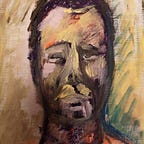I once saw a joke on the internet — “Q: How do men know that they’re approaching middle age? A: They suddenly for no apparent reason, become very interested in WWI”. Well, I feel I’m ahead of the curve here — I became interested in WWI in my early 30s. I’m 39 years old now and recently my interest made it to the Vietnam War.
The Vietnam War is a strange bit of history — on one hand, it was the backdrop to a number of my childhood action films, such as “Rambo: First Blood”, “Apocalypse now”, “Full Metal Jacket” and even “Forrest Gump”. Many action heroes had been “in the Nam” and had PTSD. On the other hand, it’s more of an American thing and only deserves a passing glance in history of the 20th century from an Estonian vantage point.
So — when someone on Reddit mentioned that there’s a great PBS documentary about the Vietnam War — I jumped on it and watched all the 1035 minutes of “The Vietnam War” written by Geoffrey C. Ward and directed by Ken Burns and Lynn Novick.
It’s a masterpiece of visual storytelling. The emotions that the writer wants to convey with the story are very skillfully built up in the film — from live footage (it’s the 60s and 70s after all), to many dozens of eyewitness accounts, audio recordings of key US politicians and impactful music, composed by Trent Reznor and Atticus Ross, of Nine Inch Nails no less.
There are nearly 80 prominent interviewees from both sides of the war — from high ranking military officers, such as Merrill McPeak — former Chief of Staff at US Air Force, to Pulitzer prize winning journalists to key political advisors to Viet Cong guerillas and Vietnamese civilians.
The impressive length of the documentary — over 17 hours — allows it’s makers to go deep into each subject — from a thorough overview of the political situation in Vietnam before the war to almost month-by-month, battle by battle diary of the conflict to detailed accounts of the pro- and anti-war sentiment and political climate in the US. Most key situations are described by eyewitnesses and the story is reinforced with their personal experiences.
The tone of the film is remarkably neutral. Both Vietnamese and Americans are treated as victims of the war. The authors are observers, not critics. Even Richard Nixon’s illegal activities and Lyndon B. Johnson’s misguided escalations of the war are described as follies. If anything, “The Vietnam War” is a pacifist film — that portraits the Vietnam War as a giant mix-up, an accident of colossal proportions.
Despite being named “The Vietnam War”, this is very much a film about the United States. The North Vietnamese are one-dimensional characters in the story — they’re always tough, resilient peasants, with either a gun or a plough in their hands, ready to die for their country.
Keeping the Ho Chi Minh trail open is described almost like the Amish rebuilding the shed in the “Family Guy” cartoon — the US Air Force keeps bombing the trail to smithereens and the North Vietnamese, like ants, keep burying their dead, filling the craters and plowing the road open again overnight.
The Chinese and Soviet Union aren’t even one-dimensional characters in the story — they get a brief passing message a la “and the material kept flowing in from the communist allies”. It’s difficult to believe that the North Vietnamese communist power only got rice and bullets from the communist allies and they didn’t play a bigger role in shaping the North Vietnamese politics and identity.
The cynic in me says that this is a beautiful, haunting film about how the US went to war in Vietnam for no reason, got as many as 2 million people killed, and it made a number of US soldiers really sad.
However, if you look at it from the perspective of a middle-aged American who has just inexplicable became interested in history — it’s a beautiful, haunting film how the US went to war in Vietnam for no reason .. and the realisation that the US is not always the “good guy” nor is it invincible in battle ended up shocking and changing the US society.. all the way until 9/11.
